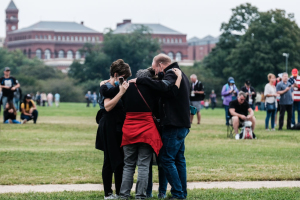No, Christian Teenagers Do Not Have to Rebel

Hello. My name is Rebecca Lindenbach, and I was the perfect teenager.
Obviously I'm saying that as a joke, but by most standards I truly was pretty perfect. I never drank, never smoked, never partied, and never even swore in high school. I may have been moody, but I always had a good job, and was extremely involved in church and volunteered in childcare and youth ministries. I walked the straight and narrow all through high school, and continued that way through college and into marriage.
I'm not saying all this to try and make myself look great–I'm saying it to make a point. I'm saying it to destroy a myth that has been hovering over Christian circles for way too long.
Teenagers do not have to rebel.
I am living, breathing proof of that statement. And I'm not the only one. I interviewed 25 young adults last summer to write a book about teenage rebellion and the results are clear—not all teens rebel.
Before I continue, let me tell you something else about myself.
I am not demure in any sense of the word. I don't like listening to authority, and I often get frustrated when I'm told what to do, or how to do it. I like to question everything, and I'm extremely stubborn when I think I'm right.
Why am I telling you this? To prove that I'm not "naturally predisposed to submit." I'm actually the complete opposite.
Whether or not teenagers rebel isn't contingent on their natural personality, and kids aren't "guaranteed" to rebel. Obviously teenagers aren't guaranteed to NOT rebel, either, but there are things you can do that make it less likely.
The young adults I interviewed were all very unique individuals—we didn't have the same personality traits at all. But we ended up at the same place, which means there must be something about what our families did that worked.
So why do teenagers rebel? And why do some teenagers never rebel? I've tried to pinpoint what kinds of things my parents did that helped my sister and me not rebel (though, of course, there are never guarantees that a teen won't rebel), and here's what I've come up with:
5 Reasons I Didn't Rebel as a Teenager
1. My parents instilled in me a sense of family honour
Often teenagers feel distant from their families, like they're part of it by blood, but that's it. In my family it was never like that. My mom and dad would make decisions on their own, of course, but they always talked everything over with my sister and me. Even things that we weren't directly impacted by–we'd discuss everything over the dinner table.
My family is the kind of family where everyone is involved–it's a team experience. A result of this is that I received a huge sense of family pride, dignity, and honour.

Family honour has been lost in our culture. We are so focused on ourselves, and have become extremely selfish. And I think a lot of that is that parents put their children's wants over the family's needs. In our family, Katie and I never went without. But we didn't get everything we wanted–I wanted an X-Box when all my friends were getting one, but because that would cut out of major family time my parents said no. A small example, I know, but it shows the worldview my family had. No matter what, family comes first.
When your mindset shifts from "me" to "we", your behaviours and your actions aren't just going to affect you–you begin to see how what you do affects other people. What I do when I'm in my free time reflects on my family, whether good or bad. And for me, that was a huge incentive to be responsible and make my parents proud.
2. My parents were extremely encouraging, but also demanding
There needs to be a middle ground. I cannot stress this enough.
So many parents I see are all about the encouragement. Their kids can't do any wrong in their eyes, and they just constantly pour love and affection and butterflies and rainbows into their children's life. And then other parents are the opposite–they don't pay any attention to their kids unless they do something wrong and then they blow up. Or, even if they don't explode in anger, they only ever criticize and never praise their children.
For those of us who didn't rebel, our families found a happy medium. We weren't coddled, but we weren't picked on, either. Our parents chose their battles, encouraging us when encouragement was necessary but without lying and telling us we were great at something when we weren't. My parents never would have told me that I should go for a career in gymnastics, because I am not flexible in the least, but then encouraged me to work hard to get my lifeguard certificate because I was really good at swimming.
We always knew where our parents stood, and through that, we always knew that they were honest, saw the real us, and still liked us.
3. My family talks about everything
Open communication was big in our family. My mom and dad always made sure not only that they had time to talk to us, but that they had a specific time and place to do it, too. When I was younger, we talked before or after reading bedtime stories, or at the dinner table when we were eating together. When we got older, that spot moved to the hot tub we had in our backyard and car trips.
The biggest part, though, was that we didn't just talk about school, work, and the like. We talked about whatever was going on in our lives–whether I was thinking about a new blog post idea, how Katie was doing with her skating, or what movie we really wanted to see–anything that came to mind.
Moreover, our parents shared things with us, too. Now, don't get me wrong, there is definitely a line here. But in our family, my parents simply humanized themselves to us. My dad would tell us about his favourite movies growing up, my mom would ask our opinions on knitting patterns.
This built a partnership between us. A partnership the actions of one person directly affected the other. Because of that relationship, I never felt like I needed to rebel to be heard, to be understood, or to get my way. I knew that if my parents said no, it was for a reason.
4. We were never expected to rebel as teenagers
My parents never encouraged any idea of teenage rebellion. They never joked about us rolling our eyes, acting exasperated, or having attitude. Rather, they actually made us think that teenagers and the whole rebellion process was stupid and unnecessary. I always figured that I would grow up straight from child to adult, with no "silly teenage stage" in-between.
Now, you may think that's no fun, or that kids need their time to be silly and make mistakes. But what kind of message does that send the teenager? If kids expect that when they hit 13 they'll start wanting to go to parties, or go out with boys, or watch inappropriate movies, then they will grow up to fulfill those expectations.
On the contrary, if they are raised to believe that those are all optional, unnecessary and somewhat frivolous, they won't want to disappoint or seem silly, and so are more likely to make positive choices and act like an adult. This doesn't mean that we miss out on a childhood, or miss out on teenage years–it just means that we use them for training for adulthood, and have fewer regrets when we're through it all.
Similarly, we had very few rules. My parents never needed them, because they didn't expect us to break them. I found from my interviews that families with long lists of rules were marked by a power struggle—the kids felt like they had no freedom, the parents were trying to maintain control.
In families with kids who didn't rebel, the parents assumed the kids would pick up on their values and make good decisions. Through close relationship, heart-to-heart talks, and–when necessary–confrontations, we learned their expectations, they learned our points of view, and our families worked together instead of parents trying to reign in their children. Now, I only think this worked because we grew up in such a structured, close, and trust-filled family, but that was a big thing for me. I never felt stifled, so I never felt a need to rebel.
5. God was centre in our home
Our home never revolved around work, sports, school, or activities. It didn't even revolve around other people–it always hinged on God and his plan for our family. Growing up in that kind of an environment shaped my view of my actions, choices, and the effect I had on others. When you're used to basing everything on God's will and God's plan, suddenly the parties don't seem as important. It isn't as tempting to lie about who you're hanging out with. Smoking and drinking just doesn't really have any appeal, because they don't help with your ultimate goal–to become a person God will use for great things.
So many times I see families who drop everything for good grades, or who don't go to church if it's a busy week at work, or who choose extracurricular activities over youth group. My family, however, was the opposite. If we were tired, too bad. Get in the car, we're going to church, because that's what God's called us to. If Mom and Dad had a hard time with work, we went to church because that's a place of rest. If I was struggling with school and needed the day to study I didn't have that choice, because it was my decision not to study earlier.
God came first in everything. And my choices were shaped because of that worldview.
I honestly don't think there's any one way to make sure your children don't rebel. Every child is different, and every family contains unique people. But all I know is that for me, this worked. In my family, the trust, communication, and centrality of God in our home made my teenage years one of partnership with my parents rather than a constant battle. And that is also seen in the lives of so many others who didn't rebel.
So don't give up hope--rebellion doesn't need to be a part of your family's story.
Rebecca Lindenbach is a psychology grad living in Ottawa, Ontario. Her book Why I Didn't Rebel offers hope that teenage rebellion might not be inevitable after all. Unafraid to tackle controversial parenting practices, Why I Didn't Rebel gives parents a chance to peek into their child's brain to see what really makes kids stay on the straight and narrow.




























